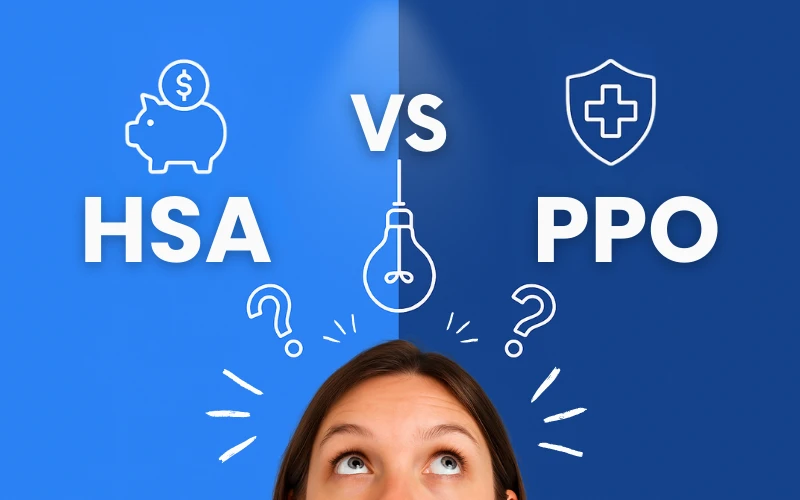The Lively Blog
SIGN UP FOR OUR
Newsletter
Stay up to date on the latest news delivered straight to your inbox
HSA vs PPO: What’s the Difference and Which Should You Choose?
Ben Luthi · October 28, 2025 · 7 min read

Open enrollment is when many people sit down and compare health insurance options — and one of the most common questions is how a PPO stacks up against an HSA. The tricky part? These terms describe very different things. A Preferred Provider Organization (PPO) is a type of health insurance network. A Health Savings Account (HSA) is a tax-advantaged savings account that you can only open if your plan meets certain criteria.
Because of that, the real decision most people face is whether to enroll in a traditional PPO plan or a high-deductible plan that qualifies for a savings account. Understanding the trade-offs between flexibility, costs, and long-term savings will help you make a more confident choice in 2025.
Understanding the Basics
Choosing between a PPO and an HSA-compatible plan starts with understanding how each one works. Here's a quick breakdown of the basics before we dive into costs and trade-offs.
What Is a PPO Plan?
A PPO (Preferred Provider Organization) is a popular type of health insurance plan that gives you flexibility when choosing doctors and healthcare providers. With a PPO, you can:
See specialists without a referral
Access care both in-network and out-of-network
Use a wide network of providers
While PPOs usually offer more convenience and flexibility, they also tend to come with higher monthly premiums and lower deductibles than other plan types.
What’s Different About High-Deductible Plans?
High-deductible plans require you to pay more out-of-pocket before your insurance begins covering most services. In return, they typically offer lower monthly premiums. These plans are often labeled as “HSA-compatible” if they meet IRS rules, which means you can use a health savings account to set aside pre-tax money for qualified medical expenses.
Key features of these plans include:
Lower premiums each month
The ability to save for medical costs with tax advantages
Full coverage for preventive care, even before meeting your deductible
This type of plan can be a smart option for people who are generally healthy or want to manage their healthcare spending more directly.
How Costs Compare: Premiums, Deductibles, and Out-of-Pocket Limits
When comparing PPOs and high-deductible options, the biggest differences often come down to cost structure.
PPOs usually have higher premiums but lower deductibles, meaning you’ll pay more each month but potentially less at the time of care.
High-deductible plans often have lower premiums, but you’ll need to cover more upfront costs before your insurance starts paying.
You’ll also want to look at each plan’s out-of-pocket maximum — the most you’ll have to pay for care in a given year. This is especially important if you anticipate significant healthcare needs in 2025.
Can You Use a Savings Account With Your Plan?
Not all health plans allow you to pair your insurance with a pre-tax savings account for healthcare. Only certain high-deductible plans are considered eligible for this.
If your plan qualifies, you can open a health savings account that lets you:
Set aside money before taxes
Spend it on qualified medical expenses
Keep unused funds from year to year
Take the money with you if you change jobs
Employer contributions can also make a big difference, helping you build savings even faster. While PPOs typically don’t qualify, some employers offer other types of accounts like FSAs or HRAs. Be sure to check what’s available during your open enrollment window.
Pros and Cons of Each Option
When choosing between a PPO and a plan that allows for tax-free health savings, it helps to understand what each offers in real-world terms. Both have advantages, but the best fit depends on your budget, how often you seek care, and whether you want to save for future expenses.
HSA-Compatible High-Deductible Plans
These plans typically come with lower monthly premiums and give you the option to set aside pre-tax money for qualified medical expenses. They're designed for people who want more control over how and when they spend on healthcare.
Advantages:
Lower premiums free up monthly cash flow
Ability to save for care with tax advantages
Employer contributions can help offset costs
Funds never expire and travel with you if you change jobs
Drawbacks:
High deductibles can be tough to manage without savings
You pay the full cost for most services until you meet your deductible
Less predictable if you end up needing frequent care or medications
Many people choose this type of plan if they're healthy, want to invest in future healthcare needs, or get strong employer contributions. However, it's important to run the numbers—especially if you’re unsure how often you’ll need care in the upcoming year. If you aren’t prepared for larger upfront costs, even basic services can be a strain.
Bottom line: This type of plan can work well if you’re financially ready and don’t need a lot of ongoing care.
PPO (Preferred Provider Organization) Plans
PPO plans tend to cost more each month, but they also offer more predictable coverage and flexibility. You don’t need referrals to see specialists, and you'll often have some out-of-network options too.
Advantages:
Lower deductibles and out-of-pocket costs than most HDHPs
Easier budgeting for regular doctor visits and medications
Larger provider networks and no referral requirements
Partial out-of-network coverage offers more flexibility
Drawbacks:
Higher monthly premiums, even if you don’t use much care
Most PPOs don’t meet IRS requirements for health savings account eligibility
No rollover savings or tax-free growth for long-term medical planning
PPOs are a go-to for people who expect regular care, want a broad network, or prefer the predictability of fixed costs. They're often a strong choice during life stages like pregnancy, managing a chronic condition, or caring for children. Still, the higher premiums can add up if you don’t use care frequently.
Bottom line: PPOs are a good match if you value convenience, flexibility, and steady costs—especially if you’re not focused on long-term savings.
Contribution Limits to Know for 2025
If you’re considering a savings-compatible plan, be aware of annual contribution limits set by the IRS. For 2025:
Individuals can contribute up to $4,300
Families can contribute up to $8,550
Those 55 and older can add an extra $1,000 as a catch-up contribution
These contributions are tax-deductible, and the funds can be used for qualified medical expenses — even in future years. For a full breakdown, check our 2025–2026 contribution limits page.
Choosing the Right Plan in 2025
There’s no one-size-fits-all answer when it comes to choosing between a PPO and a high-deductible health plan that qualifies for a savings account. The right option depends on your current health needs, your comfort level with upfront costs, and whether long-term savings are part of your healthcare strategy. A high-deductible plan might make sense if you’re generally healthy, want to lower your monthly premiums, and are looking to grow tax-advantaged savings—especially if your employer contributes to your account. A PPO, on the other hand, may be the better fit if you expect regular medical care, need access to a broad provider network, or prefer predictable costs without the need for a separate savings account.
As you compare your options during open enrollment, take time to consider your expected care needs, total annual costs, and any benefits your employer offers. The best plan is the one that fits both your present needs and your long-term financial goals.
Disclaimer: the content presented in this article are for informational purposes only, and is not, and must not be considered tax, investment, legal, accounting or financial planning advice, nor a recommendation as to a specific course of action. Investors should consult all available information, including fund prospectuses, and consult with appropriate tax, investment, accounting, legal, and accounting professionals, as appropriate, before making any investment or utilizing any financial planning strategy.

Benefits
2026 Maximum HSA Contribution Limits
Lively · February 1, 2025 · 3 min read
For 2026, the HSA contribution limits are $4,400 for individual coverage and $8,750 for family coverage. These limits increased from 2025, when the caps were $4,300 and $8,550. If you’re age 55 or older, you can still contribute an additional $1,000 as a catch-up contribution.

Benefits
What is the Difference Between a Flexible Spending Account and a Health Savings Account?
Lauren Hargrave · February 9, 2024 · 12 min read
A Health Savings Account (HSA) and Healthcare Flexible Spending Account (FSA) provide up to 30% savings on out-of-pocket healthcare expenses. That’s good news. Except you can’t contribute to an HSA and Healthcare FSA at the same time. So what if your employer offers both benefits? How do you choose which account type is best for you? Let’s explore the advantages of each to help you decide which wins in HSA vs FSA.

Health Savings Accounts
Ways Health Savings Account Matching Benefits Employers
Lauren Hargrave · October 13, 2023 · 7 min read
Employers need employees to adopt and engage with their benefits and one way to encourage employees to adopt and contribute to (i.e. engage with) an HSA, is for employers to match employees’ contributions.
SIGN UP FOR OUR
Newsletter
Stay up to date on the latest news delivered straight to your inbox
